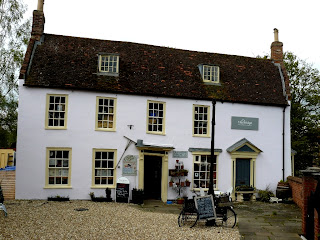
The Romans built a fort there, luckily several small sections of the Roman wall still survive. One is at the back of a supermarket, another in the public library, one small section forms part of the wall of the community centre, and there is at least one other small section, hidden away somewhere!

I always park near the old cattle market and walk the short distance into town, so one of the first shops I come across is this fruit and vegetable shop - wonderful, fresh vegetables and fruit, with the added bonus that when you go inside to pay, your nose is greeted by the perfume of a flower shop. That makes it a winner in my book. Double delight.

Horncastle was mentioned in the Domesday book and was granted a market charter in the 13th century. Markets are still held every Thursday and Saturday, with Farmers Markets taking place on the second Thursday of the month. Throughout the summer local craftsmen and women have stalls alongside the Saturday market.

I often stop for a coffee at this café - I am always lured in by the quaint appearance. Sometimes the coffee is wonderful, sometimes not. It depends who is on duty, I suppose.

This is the River Bain, one of the things which attracted the Romans to Horncastle, as you can see, it runs right alongside the café. How different it would have been in those days.

Horncastle is now famous for the number of large, and small, antique shops. Whole days can be spent browsing them. Some are pricey, others affordable - but you need to have a good rummage around.

This is the very beautiful 13th century Church of St Mary - I'll save that for another day.
I learned something new about Horncastle, apparently every August since the 1229 a horse fair was held there. It must have been some fair because it lasted for a week - sometimes two - and was reputed to have been the largest horse fair in U.K. It was discontinued in 1948.
One final snippet - in 1860 there were 48 alehouses and inns which equated to one for every 100 inhabitants. They were a thirsty lot.
These days there are probably around 8 or 9.
No comments:
Post a Comment